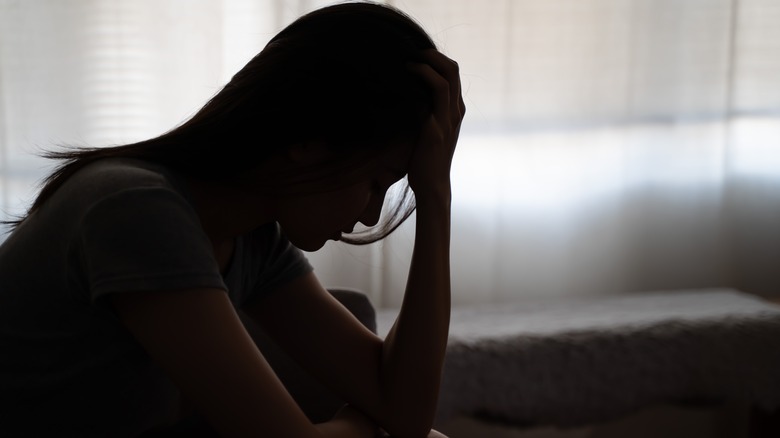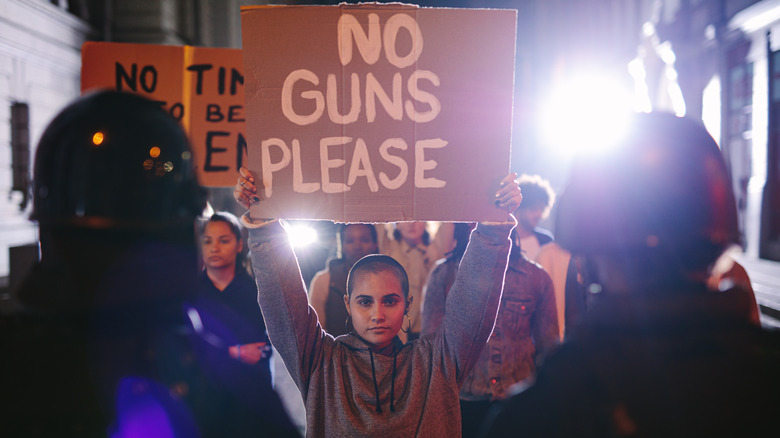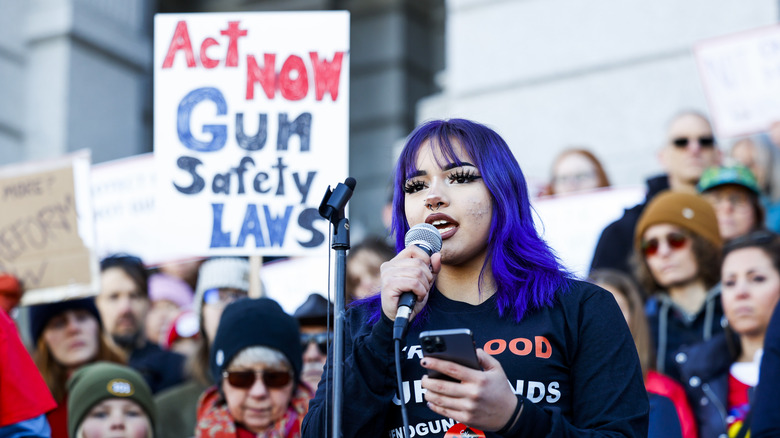New Research Confirms Weak Gun Laws Stand In The Way Of Reducing Domestic Violence-Related Deaths
Weak gun laws can be dangerous for women. One argument frequently made by the pro-gun movement is that if someone is going to harm or kill their domestic partner, they'll do it with or without a weapon. They claim that guns have very little to do with domestic abuse. However, this isn't the case. April Zeoli, a researcher from the University of Michigan Institute for Firearm Injury Prevention clarified this with CBS News. "We hear a lot, 'If people can't get guns, they're just going to commit homicide in a different way, so these laws are pointless.' But that's not what the research finds," Zeoli said.
Other news sources have corroborated this. The Guardian shared FBI data from the 1980s to 2020, showing that deaths caused by intimate partners were exponentially higher by guns than they were by knives or other methods. So the argument that guns have little impact on domestic violence simply isn't true.
In situations where guns are present in cases of domestic violence, things are far more dangerous — even deadly — for women. What makes this reality even more worrying is that in February 2023, an appeals court ruling changed gun restrictions in certain parts of the United States. The change applies to the Fifth Circuit of Texas, Louisiana, and Mississippi, which allows those with domestic violence restraining orders to own guns. Taking the startling research and statistics into account, these are horrifying changes.
If you or someone you know is dealing with domestic abuse, you can call the National Domestic Violence Hotline at 1−800−799−7233. You can also find more information, resources, and support at their website.
Recent rulings are making it easier - not harder - for prior domestic abuse offenders to have guns
There are huge changes to gun laws following the United States Supreme Court's 2022 ruling on the Second Amendment. We're already seeing the impact of gun law changes for those with domestic violence restraining orders. The appeal allows those to have a gun even if they've been deemed "a credible threat to the physical safety of such intimate partner or child," Vox reports.
Unfortunately, research shows that guns in situations of domestic violence are frequently deadly. Gun violence reporter Chip Brownlee told PBS why this was so dangerous for women. "About half of the women in the U.S. who were shot and killed with a gun every year are shot and killed in domestic violence incidents," Brownlee said. "We know from the research that having a gun in a situation raises the risk of a domestic violence murder by about 400 percent."
Zeoli told CBS News that gun restriction is a crucial part of saving lives. In states where domestic violence offenders were restricted from owning guns, the number of intimate partner homicides was lower. Zeoli spoke about a new and life-saving law that was now effective in Michigan. There, the gun restrictions also apply to violence among dating partners, as opposed to just current or ex-spouses. This affords protection to those who are or were in relationships without having been married.
Why relinquishment provisions are such a crucial part of these laws
Research around domestic violence-related deaths addresses another component of weak gun laws. Zeoli told CBS News that in some states, like Michigan, domestic violence offenders are not able to get guns, but they're not required to return guns they already have. These relinquishment provisions save lives. "Part of the law says that a judge can order the person who is now legally prohibited from having a gun, to relinquish the guns that they already have, there's a decrease in intimate partner homicide," Zeoli said.
The Guardian reported that every 16 hours, a woman is murdered via gunshot by a current or former romantic partner. The American Journal of Public Health notes that the rate of homicide goes up in domestic abuse cases when there's a gun present, and those most at risk were Black women ages 15-45. They also report that romantic partners are the most common perpetrator in the murders of American women. The Journal of Urban Health conducted research in 50 states over a ten-year period and found that women in states with more guns suffered higher rates of death by homicide as well as accidental firearm deaths and suicide. Based on these harrowing statistics, it seems plausible that stricter gun laws would create more safety for women. It's unfortunate that the reverse is happening.


